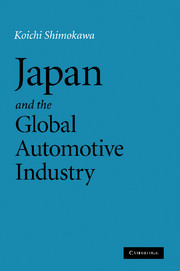Book contents
- Frontmatter
- Contents
- List of figures
- List of tables
- Preface
- Introduction
- 1 Comparing productivity of the Japanese and US automobile industries
- 2 The internationalization of the Japanese automotive industry and local production overseas
- 3 The recovery of European and US auto makers, and relocating and changing lean production
- 4 Early 1990s – the Japanese automotive industry loses international competitiveness, and the development of restructuring strategies
- 5 The restructuring of the global automotive and auto-parts industries
- 6 The restructuring of the world's auto-parts industry and the transfiguration of the keiretsu parts transaction
- 7 Global M&A and the future of the global auto industry – the light and dark sides of merger and re-alignment
- 8 The Asian and ASEAN automotive industries in the global era
- 9 China's automotive industry in the global era, Japanese auto makers, and their China strategies
- 10 Conclusion – the global automotive industry's perspective on the twenty-first century and tasks for the Japanese automotive industry
- Epilogue
- Index
- References
1 - Comparing productivity of the Japanese and US automobile industries
Published online by Cambridge University Press: 06 July 2010
- Frontmatter
- Contents
- List of figures
- List of tables
- Preface
- Introduction
- 1 Comparing productivity of the Japanese and US automobile industries
- 2 The internationalization of the Japanese automotive industry and local production overseas
- 3 The recovery of European and US auto makers, and relocating and changing lean production
- 4 Early 1990s – the Japanese automotive industry loses international competitiveness, and the development of restructuring strategies
- 5 The restructuring of the global automotive and auto-parts industries
- 6 The restructuring of the world's auto-parts industry and the transfiguration of the keiretsu parts transaction
- 7 Global M&A and the future of the global auto industry – the light and dark sides of merger and re-alignment
- 8 The Asian and ASEAN automotive industries in the global era
- 9 China's automotive industry in the global era, Japanese auto makers, and their China strategies
- 10 Conclusion – the global automotive industry's perspective on the twenty-first century and tasks for the Japanese automotive industry
- Epilogue
- Index
- References
Summary
This chapter was first published in 1982. Though more than twenty years have passed since its publication, there is still significant meaning in the author's analysis and the indications made by W. J. Abernathy and others about the reversion of competitiveness in the Japan–US automobile industry and the factors caused by the reverse in the view of Japan–US comparisons in productivities. The history of international competitiveness in the Japan–US automobile industry since then, and the contemporary lessons from the theory put forward by Abernathy, are briefly described in the addendum.
Introduction
The US automobile industry deteriorated markedly in the early 1980s due to the effects of the first oil shock of 1973, fuel regulations introduced under the 1975 energy conservation law, and the second oil shock in 1979. During 1980 and 1981, the Japanese automobile industry reached production levels of 100 million units per year and became a strong international competitor, resulting in increased protectionism in the US and Europe.
While struggling to protect themselves against Japanese competition, US and European auto manufacturers began to search for the reasons behind Japan's success. Even though the deterioration in the competitive power of the US automobile industry could be directly attributed to the energy crisis, government policies, and changes in the US market environment, it was widely agreed in business and industrial circles and amongst scholars that the resulting fall in productivity was clearly due to structural causes.
- Type
- Chapter
- Information
- Japan and the Global Automotive Industry , pp. 8 - 56Publisher: Cambridge University PressPrint publication year: 2010



